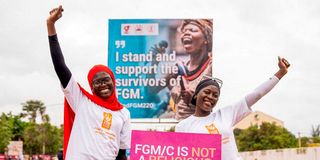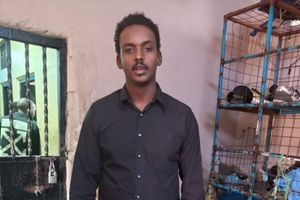The Imam's daughter who convinced the autocratic Gambian government to abolish FGM

Gambian activists Rohey Cham (left) and Sainabou Sey celebrate in Banjul, Gambia July 15, 2024, after the country's parliament rejected a bill to end a ban on FGM.
What you need to know:
- At just one week old, Jaha Dukureh underwent the most severe form of FGM, setting the stage for a life marked by two forced child marriages.
- Despite these challenges, she transformed her pain into purpose, founding Safe Hands for Girls and launching a powerful campaign that caught the attention of President Obama and Hollywood celebrities.
- Her relentless activism reached its pinnacle in The Gambia, where she remarkably convinced President Yahya Jammeh to ban FGM in 2015.
When Jaha Marie Dukureh was one week old, she underwent Type III FGM (infibulation), considered the most severe form of the practice, which involves extensive tissue removal and narrowing of the vaginal opening.
Jaha was born in the village town of Gambiasara and descends from an extensively conservative ethnicity known as Soninke. Her father was an Imam, an Islamic religious leader, who had three wives and 30 more children. His first wife was Jaha's mother, a compassionate woman of Sierra Leonean ancestry.
When Jaha was 15, her mother succumbed to breast cancer. Her father subsequently sent her to New York City in the pretence that the American trip was intentioned to help her cope with her grief. Her excitement immediately waned, when she was met by a man named Muhamed at JKF International Airport.
Her family had concocted a subterfuge and hoodwinked her into an arranged child marriage, with a man 20 years her senior. Muhamed, didn't see her as a child and her family never viewed him as a paedophile. In the midst of her trauma, Jaha contacted Equality Now, an organisation that protects the rights of women and girls.
She was introduced to Taina Bein-Aime, the executive director of the Coalition against Trafficking of Women. The institution bolstered Jaha's plight and in less than a year, she successfully divorced Muhamed. Taina and an organisation titled Sanctuary for Families vouched for her admission into a Bronx high school and provided her with enough resources to purchase school supplies.
Jaha secured part-time employment at a restaurant, which provided stability with a $1.75 (Ksh226) an hour remuneration and spent most nights sleeping in the New York subway trains. She was frequently groped and sexually assaulted by her boss at work, and accosted by discomforting lewd remarks from men who boarded the trains.
The discomfort added a layer of vulnerability to an already debilitating post-traumatic stress disorder. She sneaked into a clinic situated near the gymnasium of her school and swallowed several pills in an attempted suicide. Fortuitously, Nancy Todd, who operated the clinic discovered her and she was rushed to the emergency room of a nearby hospital.
Nancy offered her vital emotional support that persisted until she graduated. Jaha's cousin Fatoumata, then expressed her distress at the emotional turmoil Jaha was facing and suggested that her husband facilitate a marriage between his brother Hajie and her.
Jaha saw it as a decisive opportunity to escape the chaotic sexually fuelled abyss of New York City and move to the appealing serene ambience of Atlanta Georgia, where Hajie lived. He was ten years older than her and he had a first wife who was also his cousin and was living in The Gambia. At 17, Jaha was once again manipulated into becoming a child bride.
Their marriage was marred by the challenging experience of three miscarriages, a common consequence of FGM. She carried her fourth pregnancy to term and had her first child Muhammad, before delivering her daughter Khadija and last born Abu. Their marriage began declining when Hajie flew in his first wife and son to live with them, which motivated Jaha to file for divorce.
Jaha's daughter Khadija provided her with a sense of purpose to work towards reforms and rectify survival conditions for other girls. She enrolled in a community college to study business administration and embarked on a part-time task of amplifying the voices of girls.
In her memoir I will scream to the world Jaha describes how she ventured into different communities, including Clarkson Georgia, which consisted of the state's largest inhabitants of African immigrant refugees. She cultivated a clandestine underground movement that discussed the importance of exterminating the culture of silence and other nefarious societal expectations.

After graduation, she began an occupation as a personal banker at Wells Fargo Bank and launched a blog that facilitated the registration of her hallmark organisation, Safe Hands for Girls. She started receiving gravitational attention from the local Georgian press. ABC World News successively interviewed and aired her invaluable exertions, leading Jaha to file a petition on change.org, requesting the Barack Obama administration to intervene in the catastrophic vice of FGM within the US immigrant community.
The petition gained momentum and its cumulative effort received immense support from Hollywood actresses Ashley Judd and Mia Farrow. It garnered over 220,000 signatures, leading President Obama to order a study on FGM through the Centres for Disease Control and Prevention (CDC). Jaha's significant activism gained further recognition when The Washington Post, Cosmopolitan, CNN, BBC, and Al Jazeera covered her story, and she wrote op-eds for The New York Times, Medium and British daily The Guardian. As her visibility elevated, her tenacious message continued to vividly suffice.
Jaha was aware that 76 per cent of the female population in The Gambia had undergone FGM. She opted to dispatch her anti-FGM campaign to The Gambia and opened a branch of Safe Hands for Girls in Serekunda. She organised the first ever African Summit on FGM in Dakar Senegal, reinforcing the bridge between Africa and the world to accelerate the implementation of a zero-tolerance policy on practices surrounding FGM.
She then deployed a strategy of demanding for transformational reforms from the apex of governance and booking appointments that forged alliances with several government insiders. At a certain juncture, her activities caught the attention of the Ministry of Interior and she was detained under false suspicion of intending to expose the grim realities of life in The Gambia.
After her release, she was summoned to the National Intelligence Agency (NIA), for interrogation by Yankuba Badjie, the head of the NIA who was notorious for viciously torturing the citizenry. She was overcome with trepidation that she would soon be assassinated.
Their interaction surprisingly blossomed into an engaging conversation about her objectives for women and evolved into an unexpected friendship characterised by camaraderie and warm jests. Her connection with Yankuba finally propelled her meeting with President Yahya Jammeh, whose reign was marred by irrational human rights violations.
Jaha persistently persuaded Jammeh and after torrid negotiations, he announced a ban on FGM on November 23, 2015, and shortly after, a 2015 amendment to the Women's Act 2010, criminalised the practice of FGM and stipulated several deterrent punishments for contravention of the law. On July 2016, the Children's Amendment Act was subsequently enacted, prohibiting child marriage and establishing the minimum age for marriage at 18 years.
Jeff Anthony is a novelist, Big Brother Africa 2 Kenyan representative and founder of Jeff's Fitness Centre @jeffbigbrother





